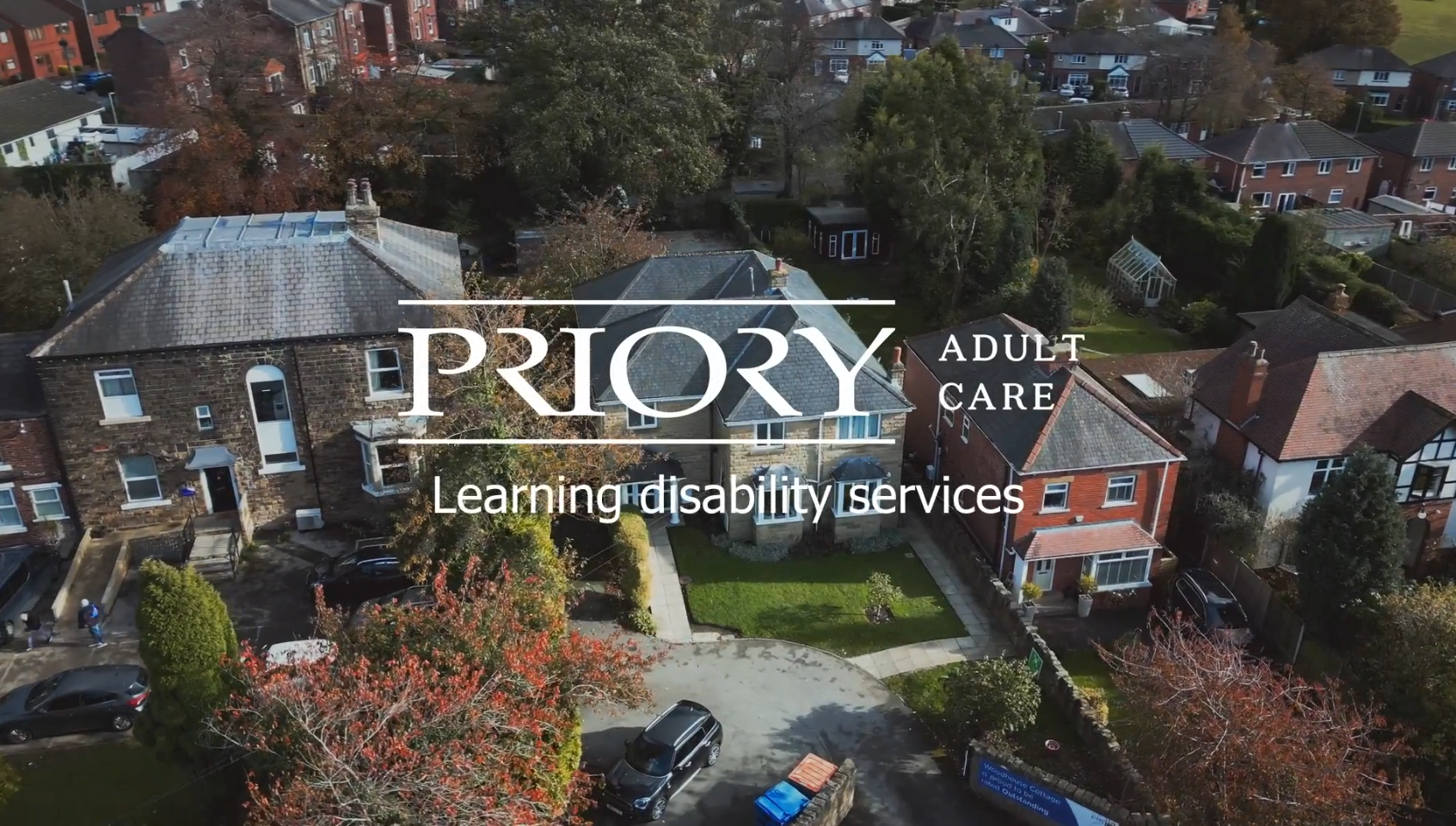About this location
Dolphin Lane is located in Thorpe, a small village in between Leeds and Wakefield. Our home offers residential support for 15 males and females with a learning disability, and people on the autism spectrum.
Our goal is to ensure that the people we care for are encouraged and supported to have the best life they can and to remain as independent as possible. We recognise that people with a learning disability have the same aspirations and expectations as everyone else and should be empowered to achieve these.
Services at a glance
Click here to enable this content
About our service
Our facilities and environment
Dolphin Lane is set in a large, detached, Victorian property. Our home has lots of space and offers a relaxed, homely environment.
The accommodation at our home is split across two floors, with the ground floor offering five double en-suite bedrooms. In addition to the main home, we also have an attached building with two self-contained flats. We have a variety of communal spaces for residents to utilise, including:
- A large lounge with plenty of seating
- Kitchen and dining room
- Activities room
We also have a garden, complete with:
- Lawn
- Patio
- Communal seating
- Summer house
Our bedrooms
All of our bedrooms are comfortable, welcoming and can be personalised to individual tastes. Our bedrooms have:
- En-suite facilities, containing a shower
- Activities of daily living (ADL) kitchenettes
Our approach to support
Everybody who lives at Dolphin Lane has their own person-centred care plan, which is co-produced with input from the individual, their family members and professionals involved in their care. We aim to help everyone in our care to make their own choices about the support they receive. This may include support in a number of areas, such as going out in the community, personal care, cooking and cleaning, and maintaining family relationships.
Our support approaches at Dolphin Lane include positive behaviour support (PBS). We also have support from a local multidisciplinary team, including the community learning disability team, who help us meet the needs of the people who live here.
The lengths of the placements that we offer at Dolphin Lane can be transitional, medium or long-term residential, depending on the needs of each person.
Activities
Everyone who lives at Dolphin Lane has their own personalised activities planner and are encouraged to take part in activities which are meaningful and fulfilling to them. Our dedicated team organise a variety of activities at the home, as well as out in the community.
Our team also work with nearby Priory services, including Daisy Vale House and Gateholme, to plan group activities such as drama classes, art sessions and dancing lessons. Everyone at Dolphin Lane also enjoys a regular weekly coffee morning, amongst other reoccurring events.
We focus on supporting our residents to grow their independence. For some people, this may mean developing their daily living skills within the home. For others, this could be accessing work or educational opportunities in the local community.
Exclusion profile
- Those who pose a risk to others in communal living areas
Pathways
Through our network of healthcare, residential and supported living facilities, we provide unique care pathways which help the people we support to progress towards greater independence. Every individual we support is provided with a bespoke pathway plan, tailored according to their individual needs. We aim to ensure that each person is supported to live a fulfilling and active life in the community.
We have successfully supported people to move from Dolphin Lane into their own tenancies or within Priory Supported Living North Yorkshire services.
Our team
Our highly experienced team consists of:
- Service manager
- Deputy manager
- Support workers
- PBS Practitioner
Our team receive specialist staff training, designed to meet the needs of each individual we support. This includes:
- Epilepsy training
- Autism specialist training
- Dysphagia training
- Learning disability training
A message from our site leader

Here at Dolphin Lane we are always person-centred in our approach to the individual and their need, and have a long standing staff team who genuinely care about our residents. The people who live here are extremely diverse with their abilities, and our support plans reflect that
Dolphin Lane’s site leader
Comments from our residents and their family and friends
I love living here. I get help being independent and to be a better person
You can have a laugh with staff, they help you grow more independent. They are helping me get ready to move into my own place, and have helped me to get a job
Family and friends FAQs
How does home leave work?
We support our residents to attend family events and visit their family homes. We will work with the resident and their relatives to ensure possible risks are managed and that everyone is supported. This may mean the individual’s key worker will come along on the visit. For those who are unable to visit their family home, we can support your loved ones with video calls.
Can friends and families visit?
Family and friends are welcome to visit. We regularly organise activities for all our residents to get together and celebrate, with family members encouraged to attend too.
Will I be involved and kept up to date with the progress of my loved one’s care and support?
Yes, we strive to keep the loved ones of our residents involved in their care. Every month, families are invited to a meeting at the home, where they will meet with the residents’ support team and hear about recent happenings at the home. We can also arrange more regular catch-ups either in person or via telephone, to ensure families are kept informed.
Will my loved one be able to have a phone or call me?
Everyone who stays with us are supported to call their loved ones any time, via phone or video call. Family and friends are also able to call as often as they like.
What are the bedrooms like?
Bedrooms are all furnished and residents are supported to personalise them to suit their needs and wishes.
Are external doors kept locked?
All units are kept locked at night, as you would your own home. During the day, residents who are able, are able to come and go on the grounds. In addition, our residents who are able, can lock their bedroom doors.
What do residents eat and how do meal times work?
We offer a wide range of meals, with a choice of meat and vegetarian options. Residents, with support from our staff, are all involved in choosing the menu for the following week. Residents are supported to choose and prepare what they want to eat, whenever they like. We encourage people to maintain healthy diets with meal plans to suit their individual tastes, and we also regularly hold themed meals, as part of our residents’ activities.
How does laundry work?
Each resident we support has their own ‘room management day’, during which they are encouraged to complete their laundry and room cleaning. Staff provide support, as and when this is required. This enables the people who live at Dolphin Lane to develop their independent living skills.
Who does the housekeeping and domiciliary tasks?
Staff support and encourage our residents to complete these tasks, to promote their independence. Each individual is assigned a daily house job, such as cooking tea, washing up, or hoovering the house. These tasks are identified and allotted during our regular residents meetings.
Is there anything they can’t bring or have?
Residents are not allowed to bring illegal substances onto the premises, or objects that could cause harm. We would also ask that people do not bring high risk personal items into the house.
How do activities work?
Activities are planned according to our residents’ choices and interests. Thorough risk assessments are conducted before any activity. Everyone has a tailored activities planner, which will include both in-house activities as well as visits into the community. Their key worker may use a variety of communication tools to ensure they can have an input into the planning of activities.
How will residents be supported with their behavioural needs?
The staff team take a positive approach when it comes to managing the behavioural needs of our residents. We use the PROACT-SCIPr-UK® framework, which means we focus on proactive strategies, rather than physical intervention. We recognise that people with a learning disability have the same aspirations and expectations as everyone else and should be empowered to achieve these.
Do residents and families have an input into the care plans?
Yes, we encourage families and extended support providers to be involved with the care plans. We use a variety of communication tools to work collaboratively with the person we care for to co-produce the plans so they are tailored to their needs. We value this important input from others where appropriate.
What are the car parking facilities?
There is on-road parking immediately outside Dolphin Lane.
What is the smoking policy?
We provide a smoking area on the home’s grounds for residents to smoke or to vape, and residents are supported to go to the shops, where they can buy things like cigarettes. We do promote healthy lifestyles and encourage smoking cessation, and can support residents with this, if this is what they choose.
What are your fees and how are they funded?
Our fees can vary, and are based on an assessment of each individual's needs. Many people are eligible for financial help towards the cost of support, and this funding can be accessed by contacting your local authority. Once funding has been agreed, we will work with your local care team to put together a bespoke package of care. Please note, referrals for NHS or Local Authority funded services must come from a referring organisation.
How to make a referral
Our service provides high quality support to people with varying levels of need. Referrals can be made through the individual’s social care team or, if relevant, their local health authority. If you are a professional looking to make a referral, please call us or fill in our enquiry form.




